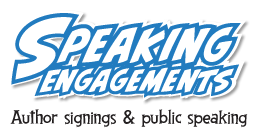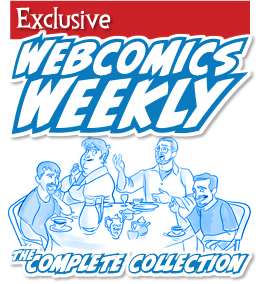Finding Your Story
You don’t need a subscription to read today’s post!
This post originally ran in April 2010. If you’ve ever been curious about the kind of information, tutorials and advice that you’ll get as part of your subscription to Webcomics.com, this is a good example.
If you’d like to join the site, you can get a 12-month subscription for $30 — or you can get a one-month Trial for $5 … with no obligation after your 30 days expire. For less than three bucks a month, you can get a steady flow of information, tutorials and advice targeted towards your webcomic business — plus a private forum to discuss issues with other professionally minded cartoonists.
 Dear Webcomics.com,
Dear Webcomics.com,
How does one discover his or her story? In listening to interviews with some of my favorite creators, I often hear the artist say that he found success by just finally putting everything together that he wanted to draw, or write about, and stopped trying to please an audience. Mike Mignola [“Hellboy”] comes to mind, as does Jeff Smith [“Bone”]; both these guys developed ideas that they loved, despite the current ‘hot thing.’ But how does one find that concept? How does one discover the story he or she really wants to tell? I find that answering this question is really hard (I’m assuming it’s hard for a lot people since there is so much derivative work out there).
This is a difficult question to address because the answer is going to come somewhat differently for each person. However, I think part of the answer is right here:
He found success by just finally putting everything together that he wanted to … write about, and stopped trying to please an audience.
I often caution people against trying to manufacture success. In other words, they try to look at what’s hot at the moment and then develop a strip that addresses its popularity. It’s probably the reason the Web is overpopulated with gamer comics. The problem with that is unless you can write — really write — material for that topic, it’s going to sound hollow to your readers, and you’ll never get the traction you need to succeed.
I’d also caution against what I call the “demographic comic.” This is a comic that is based on a strong demographic trend in hopes of attracting an audience from within that trend. An example of this is the syndicated comic, “Dustin.” The core concept of the strip is based on a group demographers called “boomerangers.” These are kids who have graduated college and then move back home with their aging, Baby Boomer parents.
As an aside, that’s not to say that “Dustin” isn’t a perfectly dandy comic or that I’m predicting its failure. What I’m warning you against is basing your writing on a demographic trend instead of basing it on one (or both) of the following:
- Your head
- Your heart
See, at first, the question is deceptively simple: “How do I know what I want to write about?” I mean… you just know, don’t you?
Well, maybe not. Maybe there’s lots of stuff, and you need to sift through it to find the best option. Maybe you’re looking in the wrong place. And that begs the question of where you should be looking. I’ve given this a lot of thought, and, to the best of my ability, I think you’re going to find the core for Your Best Story in these places.
Your head
Your Best Story just might be behind the thing that you know the most about — the topic in which you hold the most experience. And if that’s a seemingly underwhelming topic like quilting, then that’s what it is. Because you know that quilting isn’t just about blankets; it’s about community and relationships and traditions. You know about the culture that has developed among quilters. You know their language, and you know their shared experiences.
You’re an expert in something. You have an exhaustive knowledge of a topic — even if it doesn’t seem to be a particularly marketable one. And, if the past ten years have taught us anything, it’s that no topic is too mundane or too marginalized that it can’t find a healthy niche readership on the Web.
So look in your head. What’s in there? It might not be particularly awesome, but it’s yours. It’s you. Embrace it.
Your heart
Conversely, Your Best Story might lie in your heart. It might be the topic about which you are infinitely fascinated. It might be that place that your mind always wanders to — no matter where it starts out.
Maybe it’s nature. Maybe it’s the idea of life on other planets. It’s that topic that you know — no matter what — if a movie or a book comes out with this Thing as its theme, you are going to love it.
You might not know a lot about this topic, but you find it endlessly fascinating. You don’t have an exhaustive knowledge about it, necessarily; but you have an inexhaustible interest.
Huh?
And that leaves you working on a comic about needlepoint naturalists from Dimension X, right?
Well, not necessarily. (Although, it does have possibilities…)
You could develop a comic that is directly and literally linked to your Head or your Heart.
But you could also develop a comic that works off of these themes in a tangental way. For example, someone with an endless fascination of nature could easily direct that passion into an outer-space, sci-fi comic. The naturalists become explorers and the animals become aliens.
And although a comic about quilters may or may not have much of a future on the Web, a story that uses a quilt as a metaphor throughout a larger narrative of life in a rural village could certainly have legs.
The best case scenario, of course, is that you find a theme that applies to both your Head and your Heart. But I’m not going to say that it’s a prerequisite. After all, if you’re really passionate about something, you’re going to end up with the expert-level knowledge in that topic. And you can’t really hold an exhaustive knowledge without a certain amount of passion. Having one is going to lead to the other if it isn’t already there.
But I think this is where Your Story is hiding. In one of those two places. Head and heart.
One thing I can state with conviction is that starting your story from one of these places will have three effects:
- Your writing will be more true. It will have authority and conviction.
- Your ideas will come more naturally — mainly because you’ll be able to see this topic from perspectives and angles that “civilians” never approach.
- You will enjoy it more. And your enjoyment will infect your readers.




Recent comments